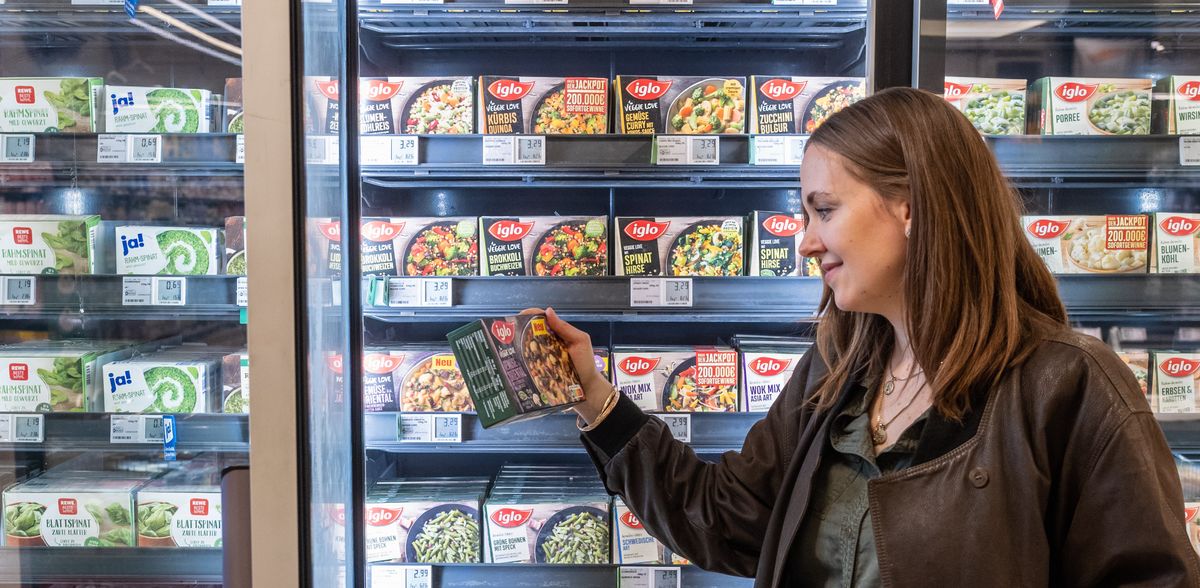Increase frozen food temperature, reduce CO2
Study on increasing the standard freezer temperature to -15°C
iglo Germany's parent company, Nomad Foods, today announced the results of its industry-leading eighteen-month study into the feasibility of increasing storage temperatures for frozen food in London to coincide with Climate Action Week. Even a minimal increase in temperature leads to a significant reduction in CO2 emissions and cost savings without compromising product safety or quality.
The study was carried out in collaboration with the food science and technology organization Campden BRI. The results now available build on the previously announced twelve-month results and add further weight to the proposal. By storing frozen food at -15°C instead of the current EU industry standard of -18°C, the energy consumption of the freezing chain can be reduced by 10-11% without compromising a product's food safety, texture, taste or nutritional value.
Nine frozen products were included in the study as examples: Poultry, breaded fish, natural fish, vegetables, plant-based alternative products and pizza. In addition, four temperatures (from -18 °C to -9 °C) were tested and their effects on eight key areas, including food safety, texture, nutrition, energy consumption and packaging effects, were assessed. After eighteen months, the results showed no significant change in the products when the minimum temperature was changed from -18 °C to -15 °C. A decrease in vitamin C content was only observed in some plant-based products whose best-before date had already passed. Options for a peer review of the study are now being considered.
Nomad Foods is the first food manufacturer to join MOVE TO -15°C
Nomad Foods is the first food manufacturer to join the Move to -15°C initiative. This is a global industry coalition launched at COP28 that is committed to reducing carbon emissions in the frozen food supply chain. However, a change in frozen storage temperatures requires both an adaptation of European regulations and industry-wide cooperation. Recognizing this, the Chief Executive Officer of Nomad Foods, Stéfan Descheemaeker, is now calling on other frozen food manufacturers to join the movement.
"We already know that frozen food performs very well in terms of carbon footprint compared to alternative preservation methods. The latest results from our study with Campden BRI highlight the crucial role that frozen food plays in reducing the wider food industry's impact on climate change," said Descheemaeker. "However, we cannot do this alone, which is why we are calling on other frozen food manufacturers to join us in the Move to -15°C coalition to ensure that the full range of products within the frozen category are tested at higher temperatures."
"Overcoming a challenge like climate change," says Philipp Kluck, CEO - iglo Germany, "requires forward-looking technical innovations and precisely this kind of science-based research in order to utilize every leverage point on the path to sustainable business and reduce CO2 emissions."
Note: This article has been translated using a computer system without human intervention. LUMITOS offers these automatic translations to present a wider range of current news. Since this article has been translated with automatic translation, it is possible that it contains errors in vocabulary, syntax or grammar. The original article in German can be found here.
Other news from the department business & finance
Most read news
More news from our other portals
See the theme worlds for related content
Topic world Food safety
Food safety is at the heart of the food and beverage industry. It ensures that the food we eat every day is not only nutritious, but also free of harmful contaminants. From field to plate, the industry monitors and regulates every step of the process with strict quality controls, advanced testing methods and continuous research.

Topic world Food safety
Food safety is at the heart of the food and beverage industry. It ensures that the food we eat every day is not only nutritious, but also free of harmful contaminants. From field to plate, the industry monitors and regulates every step of the process with strict quality controls, advanced testing methods and continuous research.






























































